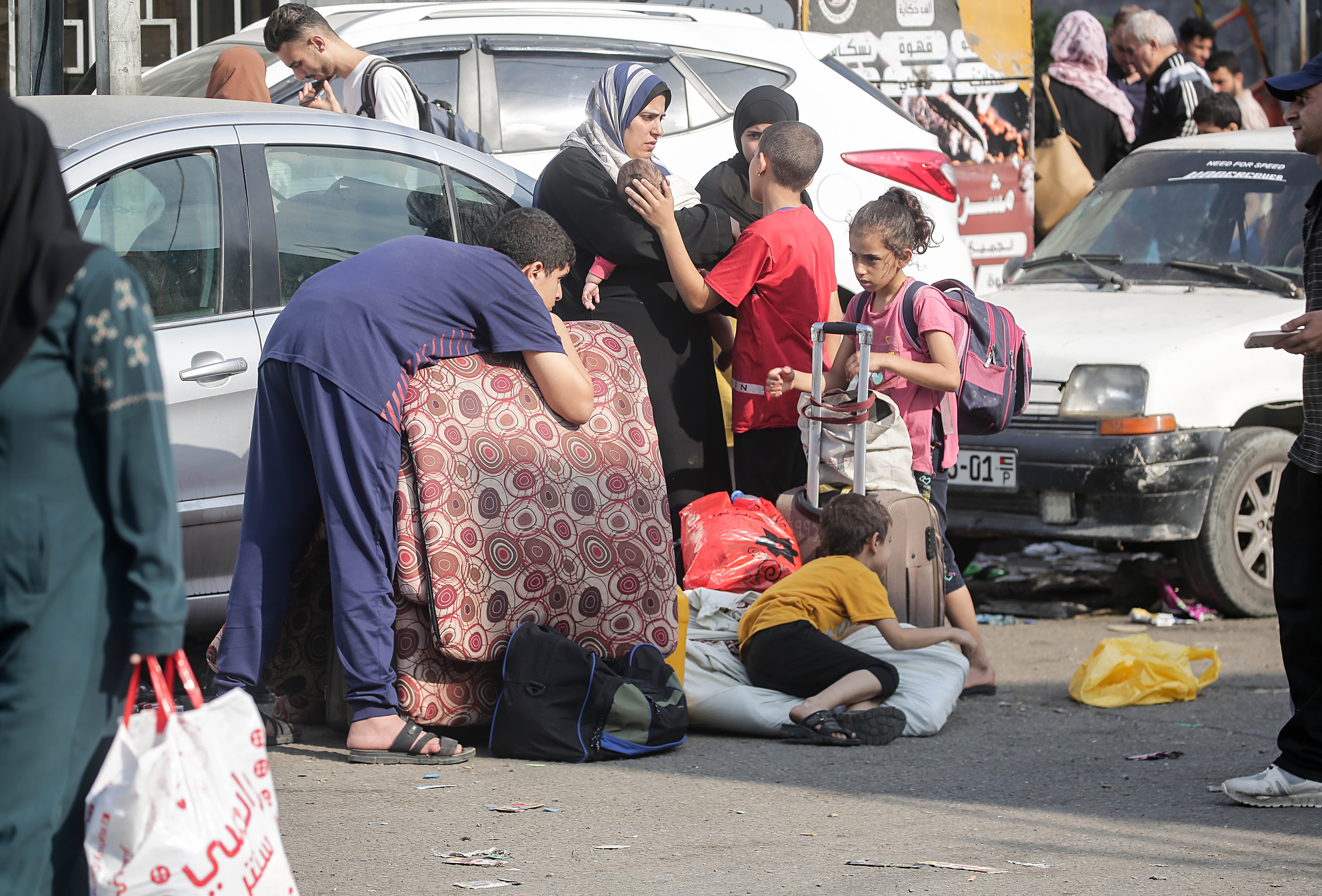The choice given to the people of Gaza is no choice at all
While thousands have fled from the north to the south in the wake of an Israeli evacuation order, others have chosen to stay in their homes, writes Donald Macintyre


For anyone who knows the territory well, the pictures of destruction in the Gaza City neighbourhood of Rimal are somehow especially shocking.
This isn’t really because it is “upscale” or “middle-class”, as it has been routinely described. Rather, its boulevards, its hotels. offices, shops and restaurants testified to something else. Rimal has long remained, for all Gaza’s bloody and turbulent history over the decades, the persistently vibrant commercial and cultural heart of what is, with two long-established universities, the most sophisticated and metropolitan of Palestinian cities. As local businessman Ali al Hayek told the Associated Press on Wednesday: “Israel has destroyed the centre of everything. That is the space of our public life, our community.”
The sense of anxiety generated by the wreckage in Rimal will have extended far into other Gaza districts. In many homes, there were no doubt fraught family conversations going on, as Israel massed its tanks and hundreds of thousands of troops on Gaza’s border for a ground invasion. That is something top Western intelligence professionals like the former MI6 chief Alex Younger have warned is actually what Hamas wants, and will radicalise another generation of young Gazans to replace dead Hamas militants.
Should we leave, as Israel is warning us to do, the families will be asking themselves, or stay put, as Hamas insists we should? Will our homes still be standing if we leave them now and will we be able to return?
Many, too, will be suspicious, that there is nowhere safe in Gaza to go whatever Israel says. Reports of a lethal bombing of a "safe route" as a convoy drove south from Gaza City will only intensify those fears. Does Israel really intend for example to leave the southern city of Khan Younis, the second largest in the territory and one that has also been struck, intact? Certainly, the search for safe havens has not always worked in the past.
During the 2014 Israeli military onslaught on Gaza – with well over half the 2,200 Palestinian deaths being civilians – I remember a trip during that war to a UN school in Jabalya in which 3,000 had taken refuge. But the school had been hit by four, high-explosive Israeli artillery shells, killing 20 people including three children and a UN employee.
Later that day, at the morgue of Gaza City’s Shifa hospital – which this week was overwhelmed with the wounded – Yusef Suleiman, 45, came the body of his cousin Ibrahim, a strawberry farmer. Ibrahim hadn’t left his home in northern Gaza until it was actually hit by a shell. He had then decided to take his wife and children to the Jabalya school.
But with grim prescience, Ibrahim had told the rest of his extended family to split up and go to three separate UN shelters. Yusef explained: “He told them: ‘Let’s not die together.’"
So while thousands of the 1.1 million people living in the strip north of the Gaza river had already left by the extended 4pm deadline on Saturday, it seemed likely that many would not. And there’s another reason beyond a judgement of what is the safest course. The majority of Gazans belong to the families of refugees who were forced to flee their homes in what is now Israel in the war of 1947 to 1948. The echoes of that “disaster”, commonly known as the “nakba”, is resounding now in Gaza’s collective memory.
Israel’s strategy wasn’t clear on Saturday. Was it hoping that Egypt would finally end its refusal to admit hundreds of thousands of potential refugees across the southern crossing of Rafah and into northern Sinai? Does Israel envisage occupying the northern sector of the Strip while persuading the international community to secure an Egyptian commitment to assume control of the southern area?
Either way, and far more than Hamas’s strident calls not to flee, it’s the determination to resist being driven from their homes again – the anticipation of a second nakba – which had led some Gazans to defy the warnings to move south.
Many people may express outrage at the Norwegian former senior UN official Jan Egeland describing the Israel Defence Force’s order to flee to the south, as a “war crime”. They will similarly reject Amnesty International’s use of the same term to describe Israel’s draconian blockade since Monday on food, fuel, and electricity supplies to Gaza.
How, they will ask themselves, can such a description be justified after the horrific massacre perpetrated by Hamas – the largest ever such mass murder of Israelis in the state’s history – on and since last Saturday? That act was indeed an egregious war crime; and made no less so, legally or morally, by 56 years of occupation or the thousands of Palestinian deaths since 2000.
But neither international law, nor the ethics of conflict, justify a war crime because it is in response to another. That argument certainly applied to the Hamas units which perpetrated the slaughter and hostage kidnapping last Saturday. I believe that argument will apply to Israel's actions (and less directly to Western governments apparently giving it carte blanche) if it continues to carry out the collective punishment of a people by forcing hundreds of thousands of Palestinians once again from their homes, just possibly forever, flattening whole neighbourhoods or causing the deaths of thousands of civilians, whose only offence has been that, for 75 years, they have had no place to live except for the Gaza Strip.
Donald Macintyre is the author of 'Gaza: Preparing for Dawn' (Oneworld, £10.99)







Join our commenting forum
Join thought-provoking conversations, follow other Independent readers and see their replies
Comments